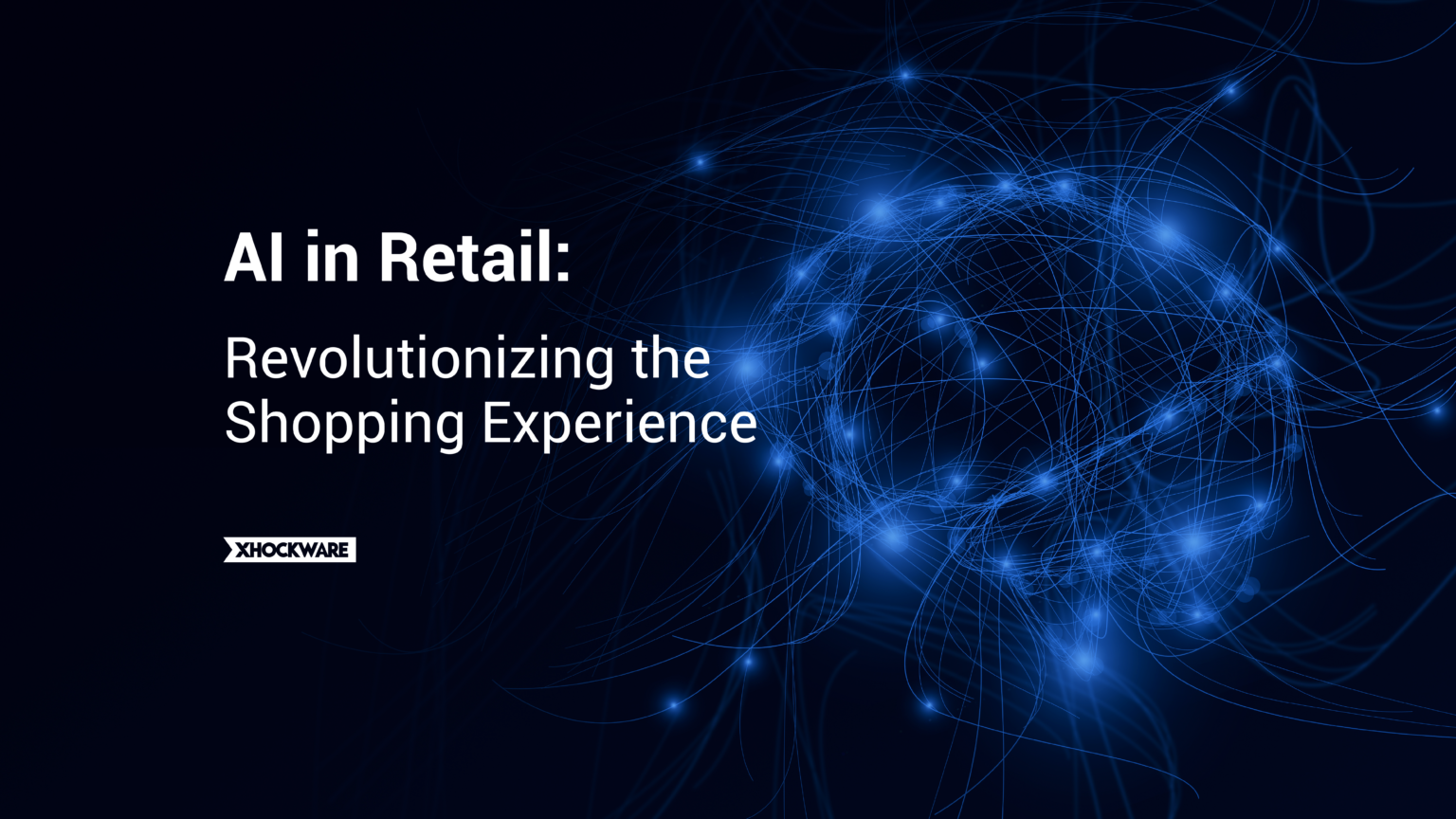Imagine walking into a grocery store, DIY store, or any other retail store where every purchase you make is supported by artificial intelligence making your shopping experiences more enjoyable, efficient, and convenient. Or, if you are a retail merchant, and get detailed and personalized customer feedback, and stay accurately updated on inventory. Luckily, this futuristic thinking is coming to reality sooner than expected.
According to Fortune Business Insights, AI in the retail market will be experiencing significant growth, driven by its ability to enhance personalization, optimize inventory management, and improve customer experience. As a result, retailers are embracing AI technologies to gain a competitive edge and meet the changing demands of consumers.

1.What will be the role of AI in retail and how is it transforming the shopping experience?
AI can significantly improve business decision-making, increase efficiency, and ultimately lead to sustainable long-term growth for the business.
The advancements in artificial intelligence have opened new possibilities for automation in various industries, which can potentially lead to increased efficiency and productivity. In retail, this means that AI is capable of:
- Noticing inventory levels
- Detecting customer habits and behavior in the store
- Personalize shopping experiences for the customer
- Faster payment transactions without needing a cashier
- Demand forecasting and inventory management
- Fraud detection and security
- Pricing optimization
- Visual recognition and augmented reality
These principles have already been used, for instance, Amazon smart grocery uses a network of sensors and AI technology. This technology utilizes an interconnected system of sensors and AI technology to monitor customers’ shopping activities in real time. This advanced system accurately tracks the items customers add or remove from their baskets as they move throughout the store. When customers are finished shopping, their connected accounts are automatically charged for the things they selected. This seamless checkout process eliminates the need for traditional cashier interactions, providing a convenient and efficient shopping experience. Some are showing concerns about what this means for consumers’ privacy. Can a customer make the purchase without being analyzed in every detail? – French retailer Carrefour does is without accessing individual information of the customer. Instead, an avatar of the customer in that store is created.
This avatar is not linked to the actual person’s identity. French multinational Retailer launched its own smart checkout system that uses cameras and scanners to monitor what customers choose to take from the shelf. A customer does not need to create an account or set up an account linked to a credit card or bank account. Simply, customers are tracked anonymously as virtual avatars. Carrefour’s “Flash 10/10” was implemented for the first time in Paris.

2.Enhancing customer experience through AI
AI is capable of customer service in many ways and will improve continuously. It can be interactive chat meaning building interactive chat programs to enhance customer service and engagement. Chatbots have already been invented, but now with a mix of AI are more effective in giving versatile answers to customers’ needs and concerns. AI can recognize facial expressions and biometric and audio cues to engage customers’ emotions. Customers can benefit from the support of an AI-powered conversational assistant that can guide them seamlessly through inquiries, resolve issues through troubleshooting, and provide answers to frequently asked questions. Should the need arise, the assistant can also connect customers with a human expert for additional assistance.
Customer personalization and insights are significantly easier to get from AI’s data based on customer preferences, feedback, and emotional satisfaction in the store. With these results, AI can suggest the right product displays, pricing, and other services through biometric promotions. In addition, AI algorithms can understand customer purchase patterns, social media behavior, or how a person navigates the store for the products.
3.Leveraging AI in product assortment optimization and inventory management
Inventory management will be easier than ever with the help of AI. Artificial intelligence can forecast demand, use camera vision, and detect on-shelf stock levels using shelf sensors. For instance, our product, Shelfn, is designed to assist vendors in this manner. Smart shelves in use at stores provide real-time monitoring of product availability, allowing for swift restocking when needed before the product becomes unavailable.
This ensures that items are readily available and quickly replenished to meet customer demand, improving satisfaction. Artificial Intelligence-powered forecasts can significantly reduce supply chain errors, lost sales, and product unavailability. This is a game changer, and indeed, big retailers are already taking steps to implement AI to manage inventory levels.

4.AI-powered payment systems and fraud prevention
AI-powered payment systems utilize advanced algorithms and machine learning to detect and prevent fraudulent activities in real time. AI can identify anomalies and raise alerts for potential fraud by analyzing transaction data and customer behavior. These systems offer faster and more secure payment methods, leveraging tokenization, encryption, and biometric authentication. As a result, retailers benefit from streamlined transactions and enhanced security measures, ensuring a seamless and protected payment experience for customers. Implementing AI-powered payment systems is crucial for retailers to combat fraud while providing efficient and trustworthy payment services.
5.The role of AI in marketing and advertising
AI revolutionizes marketing and advertising strategies by targeting campaigns, analyzing customer behavior, and optimizing content. AI algorithms analyze customer data to create personalized campaigns, forecast trends, and optimize content for higher engagement. AI-powered marketing automation streamlines workflows, allowing marketers to focus on high-value tasks. AI-driven insights improve targeting, enhance customer understanding, and optimize strategies for maximum impact. Leveraging AI, empowers marketers to deliver personalized experiences, drive growth, and achieve better campaign performance.
For instance, Intelligent display ads leverage AI inferencing capabilities to gain insights into customer engagement and interests. By analyzing real-time data, these ads adapt and customize their content dynamically based on the audience’s preferences. With this feature, advertisers can provide more tailored and captivating content to users, enhancing customer satisfaction and increasing conversion rates.
You should hop on to this revolutionizing change.
In the realm of customer service, integrating artificial intelligence can revolutionize how retailers operate. By harnessing the power of AI, retailers can substantially enhance their customer’s satisfaction. Furthermore, by reducing wait times and ensuring round-the-clock availability, retailers can accomplish this transformation in customer service with the integration of artificial intelligence. In essence, AI in customer service can completely transform the dynamics of the retail industry by optimizing operations and elevating the overall customer experience. In the highly competitive retail landscape, both physical and digital stores must navigate challenging environments. To stay relevant, retailers can utilize AI to transform the consumer experience and gain a competitive edge. AI enables personalization and agility, optimizing inventory through demand forecasting. It empowers retailers to captivate customers with personalized and immersive experiences across all touchpoints.

By leveraging predictive analytics, retailers can lead with innovation and differentiate their products. AI also helps retailers extract valuable insights from disparate data sources and synchronize offline and online retail channels for a seamless shopping experience. Furthermore, it enables the development of flexible logistics networks to meet evolving consumer demands. Implementing AI in retail may seem complex, but retailers can navigate the process successfully with the appropriate guidance.
Embrace the AI revolution in retail and watch your business soar to new heights, delivering enhanced customer experiences and optimizing operations like never before.
Text written by:
Olli-Veikko Möttönen
Xhockware Market Analist
